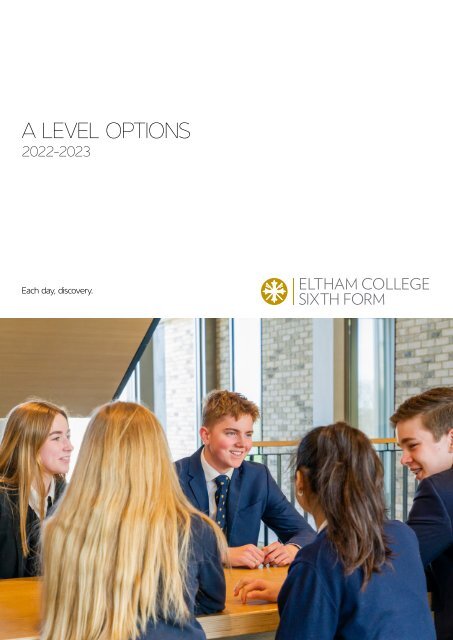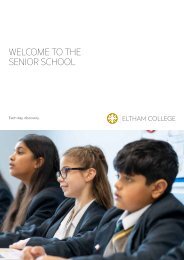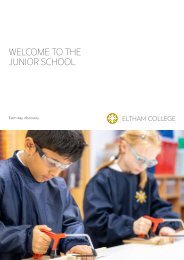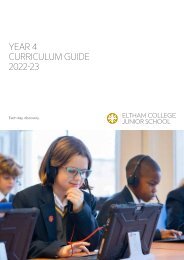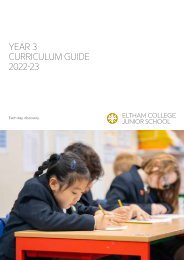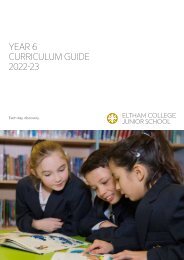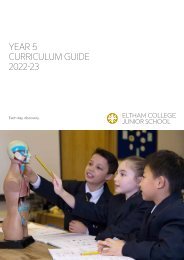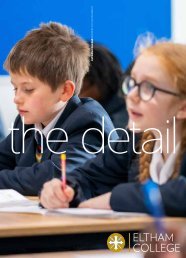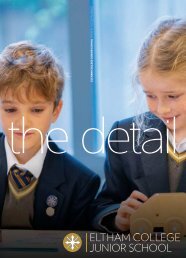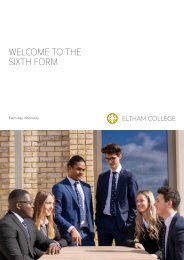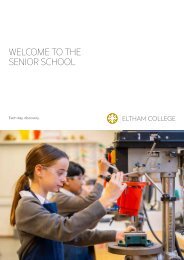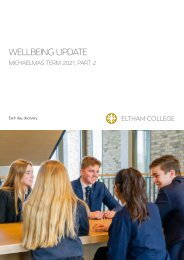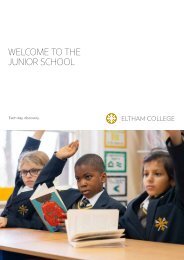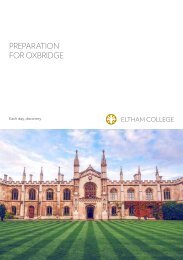Create successful ePaper yourself
Turn your PDF publications into a flip-book with our unique Google optimized e-Paper software.
A LEVEL OPTIONS<br />
2022-2023<br />
Each day, discovery.
Each day, discovery.<br />
02<br />
INTRODUCTION<br />
03 04<br />
A ‘3 PLUS’ SIXTH FORM<br />
CURRICULUM<br />
CHOOSING YOUR<br />
OPTIONS FOR A LEVEL<br />
05<br />
A LEVEL RESULTS<br />
SUMMARY<br />
06<br />
SUBJECTS
Each day, discovery<br />
2<br />
Introduction<br />
INTRODUCTION<br />
Life in the Sixth Form is a significant stage in a student’s academic<br />
and personal development. It offers the opportunity to pursue<br />
chosen academic subjects in much greater depth, whilst offering a<br />
wealth of sporting, recreational and cultural opportunities, as well as<br />
preparation for the world beyond school.<br />
We aim to:<br />
• Instil a love of learning to achieve excellent academic outcomes<br />
• Provide exceptional artistic, sporting and musical opportunities<br />
so that students develop diverse talents, enjoy their school<br />
days, and excel in their future lives<br />
• Provide strong pastoral care and a tolerant, and mutually<br />
respectful environment so that all members of the school<br />
community are known, value and supported as individuals<br />
• Recruit and develop passionate and committed teaching and<br />
support staff, recognising that their skill and expertise creates<br />
an outstanding and well-managed school<br />
• Enable students to consider Christian beliefs and values whilst<br />
warmly including those of other faiths and none so that all<br />
might live a life for the benefit of others<br />
• Maintain strong ties with everyone within the community<br />
• Provide excellent facilities that meet the educational needs of<br />
present and future students and those who teach and support<br />
them<br />
We therefore expect that our students will:<br />
• take greater responsibility for the management of their studies<br />
• develop the self-discipline and motivation to thrive<br />
academically<br />
• conduct wider independent reading and research which is<br />
linked to university-related study and extends their learning<br />
beyond the prescribed syllabus<br />
• possess the skills needed to excel in their academic studies<br />
• develop intellectual, cultural and sporting interests<br />
• show appropriate initiative and the desire to help others<br />
• act as excellent role models to younger students<br />
• hold positions of school responsibility<br />
Sixth Form students learn to balance the greater freedoms that exist<br />
alongside the ability to cope with new challenges, pressures and<br />
responsibilities. To make the most of the opportunities on offer,<br />
students will need to use effective study habits in a more<br />
independent manner than at GCSE.<br />
Their success in overcoming these challenges successfully is<br />
excellent preparation for the students’ professional life and will make<br />
them a highly attractive prospect to both universities and employers<br />
alike, as well as enabling them to achieve excellent academic<br />
grades.<br />
FORTHCOMING DEADLINES<br />
This booklet is issued now to provide you with the information you<br />
need to enable you to select your A <strong>Level</strong> options.<br />
In order to discuss and confirm your choices, there are several<br />
information and options evenings before choices are submitted in<br />
January.<br />
• External candidates who have accepted their places will be<br />
invited to attend the <strong>Options</strong> Evening on Thursday 13<br />
January 2022<br />
• Internal candidates have an information evening on Tuesday 9<br />
November 2021 and a Parents’ evening covering mock<br />
results and option choices on Monday 24 January 2022<br />
The aim of these evenings is to provide a space for you to ask<br />
questions you may have about the subjects on offer, and your<br />
suitability to take them. Teachers and the Sixth Form pastoral team<br />
will be available to help with any issues you may have at this stage<br />
and in the following weeks.<br />
After the Parents’ Evening, we will ask you to choose your subjects,<br />
and to communicate your choice on the A <strong>Level</strong> Subject Choice<br />
Form no later than Friday 28 January 2022.<br />
The form will be sent out via email prior to the Parents’ Evening.<br />
The timetable for next year will be constructed on the basis of the<br />
replies you provide at this stage; later changes to your choices are<br />
possible only if they can be accommodated within the sets allocated<br />
after the initial choices are made.
A ‘3 Plus’ Sixth Form<br />
curriculum<br />
3 PLUS<br />
With the re-introduction of linear A <strong>Level</strong>s, universities are adapting<br />
their offers for prospective students. For most students the offer of a<br />
university place is dependent on receiving three strong A <strong>Level</strong><br />
grades as well as showing wider interests and a range of important<br />
transferable skills. As the new A <strong>Level</strong>s also contain significantly<br />
more content, the amount of teaching time per A <strong>Level</strong> has<br />
increased by 25% since 2018 to ensure that all students are able to<br />
explore their subject in full and achieve their potential.<br />
In addition to their choice of three core A <strong>Level</strong>s, we also help<br />
students to prepare for the most competitive universities with an<br />
extended curriculum and a comprehensive Oxbridge Programme –<br />
this is the ‘Plus’ side of academic life at Eltham College.<br />
Students must therefore choose from one of the three options<br />
below, as well as actively engage with our Career Learning<br />
Programme:<br />
1. An accelerated Further Maths fourth A <strong>Level</strong> on a reduced<br />
timetable<br />
2. The Extended Project Qualification (see below)<br />
3. Be able to demonstrate significant co-curricular commitments<br />
outside of school, such as playing county level sport, playing<br />
for a number of regional music ensembles, LAMDA etc.<br />
EXTENDED PROJECT QUALIFICATION<br />
The EPQ is a process-based qualification. It has been designed to<br />
encourage and develop skills including independent research,<br />
analysis, communication and how to plan and deliver a presentation<br />
to a small audience. This qualification is of particular interest to<br />
Higher Education institutions as it has been designed to prepare<br />
students for the rigorous demands and expectations within their<br />
chosen degree course. Much of the work is carried out<br />
independently with the taught element of the course delivered by<br />
the EPQ Co-ordinator. Students are allocated a trained supervisor to<br />
support them during their project.<br />
Students may choose to take the Extended Project Qualification as<br />
an extension from an existing area of study or explore an area of<br />
personal interest. It is equivalent to half an A <strong>Level</strong> and students will<br />
be expected to produce a Production Log, written report and show<br />
evidence of a presentation for assessment.<br />
Past titles have included:<br />
• Has the increased use of technology been positive for the<br />
sport of Rugby Union?<br />
• Are we treating our women’s prison population appropriately?<br />
• How did the GDR ideology influence language in East<br />
Germany from 1949 – 89?<br />
CAREER LEARNING AND OXBRIDGE PROGRAMMES<br />
Our Career Learning Programme is designed to prepare students for<br />
the world beyond Eltham College. It develops important career<br />
management skills, including a positive and resilient mindset, as well<br />
as the ability to make informed decisions and network effectively.<br />
Through engagement with universities, apprenticeship providers<br />
and employers, students are empowered to build their own<br />
knowledge about career, while gaining a better understanding of<br />
themselves. An important aspect of the programme is a period of<br />
meaningful work experience during the Summer Term in Lower<br />
Sixth. Students can source a suitable placement themselves or take<br />
advantage of the many opportunities provided by the school.<br />
The Oxbridge Programme provides a structured range of activities<br />
designed to challenge and support our most-able students on their<br />
journey towards an application to Oxford or Cambridge. From<br />
College visits and conferences, to workshops and interview<br />
preparation, our Oxbridge candidates benefit from high levels of<br />
advice and guidance every step of the way.<br />
REPORTING PROGRESS<br />
The progress of all students is formally assessed around five times a<br />
year, consisting of a mixture of grades, reports and Parents’<br />
Evenings. Every student is given a Challenge Grade for each subject<br />
early in the Lower Sixth. The Challenge Grade is the grade that a<br />
student could realistically be expected to aspire to with consistently<br />
strong application. We then report progress against this target<br />
throughout the A <strong>Level</strong> course with On Track to Achieve grades.<br />
The On Track to Achieve background is coloured to indicate<br />
progress, as follows:<br />
Blue<br />
Green<br />
Amber<br />
Red<br />
The On Track To Achieve grade is above<br />
the Challenge Grade.<br />
The On Track To Achieve grade is the same<br />
as the Challenge Grade.<br />
The On Track To Achieve grade is one<br />
below the Challenge Grade.<br />
The On Track To Achieve grade is more<br />
than one below the Challenge Grade.<br />
In the case of an Amber or Red grade, a short formative comment is<br />
provided to advise how progress can be improved.<br />
When we communicate progress home we take care to discuss this<br />
with students. We set aside a week of pastoral time every half term<br />
for the Form Tutor to discuss progress and targets with each<br />
student individually. This allows us to help the student make as<br />
much individual progress as possible. Full written reports, with<br />
longer comments, are sent home once a year and there are two<br />
Parents’ Evenings in Lower Sixth and one in Upper Sixth.
Each day, discovery<br />
4<br />
Choosing your options<br />
for A <strong>Level</strong><br />
CURRICULUM OPTIONS<br />
At Eltham College, students will typically study either three or four<br />
A <strong>Level</strong>s in the Sixth Form. Students should consider both their<br />
enjoyment of the subject and combinations that will allow them to<br />
access the degree programme and career of their choice when<br />
picking their options. Heads of Departments will be available to<br />
discuss appropriate A <strong>Level</strong>s for relevant degrees. All advice from<br />
Universities at this stage is that three strong A <strong>Level</strong>s put students<br />
in the best position during application.<br />
PICKING SUBJECTS<br />
A <strong>Level</strong> choices are an exciting opportunity for students to specialise<br />
in the subjects they find most interesting. Selecting three subjects<br />
at A <strong>Level</strong> allows students to access the full breadth of the new,<br />
more detailed courses. Whilst experience show us that students<br />
who pick the subjects they most enjoy are likely to achieve the<br />
greatest success, it is important to consider the entry requirements<br />
of any particular degree course that may currently be of interest.<br />
That said, we recognise that at this stage many students do not<br />
have a clear idea of their post-18 pathway, and as a result should<br />
focus on those three subjects in which they feel they can excel.<br />
Full details of degree entry requirements can be found on the UCAS<br />
website. In addition, Heads of Department are happy to provide<br />
information and context to subject combinations and choices at the<br />
16+ <strong>Options</strong> Evening.<br />
Whilst picking options watch out for:<br />
• Requirements for University course<br />
• Unrealistic combination by picking subjects you have to do<br />
instead of picking subjects you enjoy<br />
CHECK: Do I have to do it?<br />
https://www.informedchoices.ac.uk/<br />
GCSE REQUIREMENTS TO STUDY AN A LEVEL COURSE<br />
Students wishing to study A <strong>Level</strong>s at Eltham College must achieve<br />
a minimum of six grade 7s at GCSE and meet the subject specific<br />
criteria for their chosen A <strong>Level</strong>s given below.<br />
Subjects that have been studied at GCSE<br />
• For Mathematics, Biology, Chemistry and Physics a grade 9 or<br />
grade 8 at GCSE in the corresponding subject is required to<br />
study that subject at A <strong>Level</strong>.<br />
• If Combined Science has been studied then a minimum of a<br />
grade 8/8 is required to study Biology, Chemistry or Physics.<br />
• For Further Mathematics a Grade 9 is required in Mathematics<br />
and, if studied, an A/B in Additional Mathematics or grade<br />
9/8/7 in IGSE Further Mathematics.<br />
• For English a grade 7 or above is required in both English<br />
Language and English Literature.<br />
• For Music a grade 9/8/7 in Music GCSE and a minimum of a<br />
grade 5 in at least one instrument is also required (grade 5<br />
theory is an advantage but not essential). If you have not<br />
studied GCSE Music, then grade 5 Theory and grade 6<br />
practical (ABRSM or TRINITY) is required.<br />
• At least a Grade 9/8/7 is required in Short Course Religious<br />
Studies to study Religious Studies at A <strong>Level</strong> if the full course<br />
has not been studied.<br />
• For all other subjects, a minimum of a grade 7 in the<br />
corresponding subject is required, although we recommend a<br />
grade 8 or 9.<br />
Subjects that may not have been studied at GCSE<br />
Where a student has not studied the subject at GCSE, the following<br />
criteria apply:<br />
• For Economics and Computer Science (if not studied at GCSE)<br />
a grade 9/8/7 is required in Mathematics.<br />
• For Psychology a grade 9/8/7 is required in either Biology or<br />
English Language and a grade 7 in Mathematics.<br />
• For Politics a grade 9/8/7 is required in History, English<br />
Language or English Literature.<br />
• For Geology a grade 9/8/7 is required in at least one of the<br />
Sciences or in Geography and a grade 7 in Mathematics
A <strong>Level</strong> results<br />
summary<br />
RECENT A LEVEL RESULTS BY SUBJECT<br />
Some students have asked for recent subject grades, which are<br />
given below. Students should, nonetheless, choose subjects that<br />
they enjoy and are good at and not be overly guided by previous<br />
results.<br />
2021<br />
Percentages<br />
3 Year Rolling<br />
Average Percentages 19/20/21<br />
Subject<br />
A* A*-A A*-B A* A*-A A*-B<br />
Art 100.0 100.0 100.0 77.3 100.0 100.0<br />
Biology 75.0 100 100 53.3 95.0 100.0<br />
Chemistry 64.0 88.0 100.0 33.3 76.2 93.7<br />
Computing 57.1 85.7 100.0 60.0 92.0 100.0<br />
Design & Technology 100.0 100.0 100.0 55.0 80.0 100.0<br />
Drama 63.6 100.0 100.0 44.4 81.5 100.0<br />
Economics 34.4 71.9 100.0 28.0 73.2 95.8<br />
English 57.7 88.5 100.0 47.9 75.0 93.8<br />
French 83.3 83.3 100.0 65.0 95.0 100.0<br />
Geography 82.9 100.0 100.0 62.2 91.5 98.8<br />
Geology 87.5 100.0 100.0 63.2 100.0 100.0<br />
German 100.0 100.0 100.0 25.0 75.0 75.0<br />
History 74.2 100.0 100.0 52.9 86.8 100.0<br />
Latin 100.0 100.0 100.0 83.3 83.3 83.3<br />
Mathematics 72.0 89.3 96.0 48.6 74.9 91.8<br />
Further Mathematics 77.3 90.9 90.9 60.4 90.6 94.3<br />
Music 100.0 100.0 100.0 53.8 92.3 100.0<br />
Physics 93.8 96.9 100.0 52.8 85.4 95.5<br />
Politics 76.2 95.2 100.0 45.3 79.2 98.1<br />
Psychology 64.3 85.7 92.9 39.5 73.7 97.4<br />
Religious Studies 60.0 100.0 100.0 50.0 83.3 100.0<br />
Spanish 100.0 100.0 100.0 33.3 50.0 91.7<br />
A <strong>Level</strong> Totals 77.2 92.2 98.5 49.6 82.4 96.4
Each day, discovery<br />
6<br />
Subjects<br />
ART<br />
Students studying Art at Eltham College take a Fine Art course,<br />
which allows them to work across a wide range of materials and<br />
techniques including painting, drawing, mixed-media, sculpture,<br />
land art, installation, printmaking, film, animation, video and<br />
photography. The art department is well-resourced with materials,<br />
equipment and a substantial art library. There is an<br />
Artist-in-Residence who has a studio in the department and all the<br />
staff in the department are practising artists, which makes for a<br />
creative environment with a wide range of expertise.<br />
The course introduces a range of materials and techniques along<br />
with the opportunity for students to experiment extensively and<br />
discover their own interests as artists. Experimentation is supported<br />
by their exploration into the work of other artists. The course starts<br />
with a trip to London Galleries to generate ideas and leads into an<br />
exploratory unit that offers the students a good grounding for the<br />
course. The coursework is worth 60% of the A <strong>Level</strong> mark which<br />
needs to include one major project that covers all areas of the<br />
assessment. The externally set task is set in early February of Upper<br />
Sixth giving students a wide range of starting points and the<br />
chance to develop their own interests. Both aspects of the course<br />
require students to be able to record confidently through drawing<br />
and photography, to use artists to support their work and to<br />
experiment extensively refining their work to bring it to a conclusion.<br />
The course becomes gradually more focused upon the students’<br />
strengths and interests. There are a highly diverse range of<br />
approaches adopted which support many students to gain places<br />
on art-related course at university: from Architecture to Graphic<br />
Design, Fashion to History of Art.<br />
There are many opportunities throughout the course, including a<br />
trip to a European city in October half term and weekly workshops<br />
each Tuesday evening. The Gerald Moore Gallery also offers the<br />
students a whole host of unique opportunities. It is a professional<br />
gallery space on the school site which exhibits work from national<br />
collections and also commissions new works, hosts events and runs<br />
classes. There are regular workshops in the space, the opportunity<br />
to meet and collaborate with artists, run events and the chance for<br />
students to curate an exhibition of their own work.<br />
BIOLOGY<br />
The relevance of Biology in the modern world is undeniable. From<br />
medicine to climate change, Biology holds many of the answers to<br />
the challenges our world faces. It is a fascinating subject that helps<br />
us to understand more about ourselves and the natural world in<br />
which we live.<br />
At Eltham College, we follow the AQA A <strong>Level</strong> specification. This is<br />
an excellent, challenging, yet thoroughly enjoyable course that will<br />
give you a deep understanding of fundamental biology topics, as<br />
well as many skills that can be applied to a wide range of future<br />
studies and careers. In the first year you will study topics including<br />
cell division, transport, exchange, the immune system, genetics,<br />
natural selection, ecosystems and genetic diversity. In the second<br />
year we take an in-depth look at the complex biochemical<br />
processes of respiration and photosynthesis, as well as the nervous<br />
system, hormones, population genetics and modern gene<br />
technology.<br />
As in all A <strong>Level</strong> Sciences, you will carry out a series of 12 ‘Required<br />
Practicals’ over the two years. In these, you will be assessed against<br />
a series of established criteria and gain experience using a variety of<br />
apparatus and techniques to achieve a ‘Practical Endorsement’. The<br />
AQA practicals are excellent and perfectly complement the theory<br />
you will learn in class. You will, of course, carry out other practical<br />
activities too, and at the end of Year 12 we go away on a field<br />
course to put ecological theory into a real-world context.<br />
There are many reasons to study A <strong>Level</strong> Biology, from pure<br />
enjoyment and interest to a desire to pursue the subject further in<br />
higher education and careers. The department has an excellent<br />
track record in supporting students with medical and university<br />
applications. As mentioned, the course is challenging and will push<br />
you to develop highly transferable analytical and evaluative skills<br />
alongside your subject knowledge. We explicitly teach these skills,<br />
enabling you to reach your potential in examinations. You will be<br />
taught by two subject specialist teachers who are ably supported<br />
by an excellent and well-resourced technician team.<br />
CHEMISTRY<br />
Chemistry is central to an understanding of natural phenomena and<br />
the creation of useful products. Chemists are at the forefront of<br />
research in new technologies in medicine, materials, food and<br />
alternative energy production. It is because of this key role in<br />
emerging markets that employment prospects are good. However,<br />
it is important to remember that the skills acquired in Chemistry are<br />
applicable to many different and varied career choices. Eltham<br />
College follows the AQA Chemistry specification (7405) at A <strong>Level</strong>.<br />
The modern syllabus builds on topics begun at GCSE, advancing a<br />
fundamental understanding of key principles. Many skills are<br />
developed throughout the course, such as mathematical problem<br />
solving, analysis and evaluation. Students may already be familiar<br />
with some topics in this course from GCSE, but these are now<br />
studied in much more depth. In the Lower Sixth, students study<br />
foundation topics such as atomic structure, periodicity, quantitative<br />
chemistry, energetics, organic chemistry and analytical techniques.<br />
During the Upper Sixth, students are introduced to topics which<br />
include equilibria, aromatic chemistry, thermodynamics, and<br />
inorganic chemistry.<br />
The A <strong>Level</strong> course is designed specifically to ensure that the<br />
learning of the subject is, where possible, practically based. It is<br />
necessary to provide evidence that around 12 core practical tasks<br />
have been completed, though in practice many more experiments<br />
are carried out across the two year course. The practical tasks<br />
enable students to develop the necessary observational and<br />
analytical skills required of a good scientist. Students learn to handle<br />
chemicals with confidence and gain the dexterity to carry out<br />
practical procedures with due care to accuracy and safety.<br />
Chemistry A <strong>Level</strong> is almost always essential for entry into<br />
Medicine, Veterinary Science, Dentistry, Chemical Engineering as<br />
well as most Medical and Biological Sciences. A <strong>Level</strong> Chemistry<br />
provides a sound training in scientific methodology and enquiry,<br />
which is highly regarded in higher education and in the wider world<br />
of employment. As well as becoming scientists, engineers and<br />
doctors, students with Chemistry often move into areas of Business<br />
Management, Law and Finance where a logical, enquiring mind is a<br />
highly desirable asset.
Subjects<br />
COMPUTER SCIENCE<br />
A <strong>Level</strong> Computer Science is valued by universities and employers<br />
since it requires the development of analytical thinking and<br />
problem-solving skills. It also provides excellent preparation for the<br />
study of Computer Science at undergraduate level and for the<br />
Computing element of Mathematical, Engineering and Scientific<br />
degrees. Although no prior study of Computer Science is required,<br />
students that have an interest in programming and problem-solving<br />
gain most from the course.<br />
The department uses the AQA A <strong>Level</strong> in Computer Science due to<br />
its modern content and its academic though practical nature.<br />
Students will develop a working understanding of object-oriented<br />
design techniques, the C# programming language, functional<br />
programming via the Haskell programming language, abstract data<br />
types, computer hardware, database design using SQL and<br />
techniques used to represent data.<br />
Students are assessed via a practical programming paper, a written<br />
theoretical paper and a programming project. A significant amount<br />
of time is therefore spent developing students programming and<br />
problem-solving skills over the duration of the course.<br />
DESIGN AND TECHNOLOGY<br />
Design and Technology at A <strong>Level</strong> endeavours to challenge<br />
creativity in students, providing a thought-provoking qualification<br />
which strengthens their practical skills, theoretical knowledge and,<br />
importantly, the confidence to succeed in a number of careers.<br />
Eltham College follows the newly introduced AQA Design and<br />
Technology: Product Design qualification and the students gain a<br />
level of criticality that is useful in all subjects and particularly useful in<br />
higher education, through the substantial undertaking of their major<br />
written and practical project.<br />
Students will investigate historical, social, cultural, environmental and<br />
economic influences on Design and Technology, whilst enjoying<br />
opportunities to put their learning in to practice by producing<br />
products of their choice. Students increase their understanding and<br />
practical application of leading industry software, including<br />
Solidworks and CREO 3D CAD and explore the relationship<br />
between solid modelling of their design ideas and prototype<br />
realisation through several of the CAM solutions available to them.<br />
Eltham College has well-equipped workshops, with several 3D<br />
printers, including a highly accurate SLA 3D printer, a CNC Plasma<br />
Cutter, two CNC routers and powerful laser cutter, in conjunction<br />
with traditional fabrication facilities.<br />
The A <strong>Level</strong> is examined through two written papers, a written<br />
portfolio and a final prototype for the non-examined assessment<br />
(NEA), worth 25% each and 50% of the qualification, respectively.<br />
The Design and Technology A <strong>Level</strong> is recognised as a third A <strong>Level</strong><br />
for most Engineering courses for prospective students wishing to<br />
apply to Oxford, Cambridge and Imperial Universities.<br />
Students will gain a real understanding of what it means to be a<br />
designer, alongside the knowledge and skills sought by higher<br />
education and employers. They will follow an iterative design<br />
process, investigating valid solutions to real problems with real<br />
clients, placing them into relevant design situations at an early stage.<br />
The course is strongly recommended for students wishing to read a<br />
design related discipline, Engineering or Architecture.<br />
DRAMA<br />
The WJEC Eduqas A <strong>Level</strong> in Drama and Theatre is an exciting and<br />
inspiring course. This highly practical specification provides students<br />
with the opportunity to work as either performers and/or designers<br />
on three different performances.<br />
It is a natural progression from GCSE Drama, but it is not essential to<br />
have taken that course. Students should have an interest in how<br />
play texts are brought to life in performance. There is something<br />
very special about live performance to an audience, as this form of<br />
communication has been part of human life for thousands of years<br />
and is still very much alive today. In following this course, students<br />
will gain a deeper understanding of how theatre works and have<br />
numerous opportunities to be a performer, a designer and an active<br />
audience member.<br />
The course is designed to encourage students to make connections<br />
between dramatic theory and their own practice. While preparing<br />
their practical work, they will explore the work of two theatre<br />
practitioners (individuals or companies) and then apply their<br />
research to their performances or designs. Students are also<br />
required to watch live theatre productions and learn about the<br />
processes and practices involved in interpreting and performing<br />
theatre. They will explore two complete performance texts and one<br />
extract from a third text. Being a Drama student will be thought<br />
provoking, challenging and exciting.<br />
ECONOMICS<br />
Economics is the study of resource allocation. In short: who gets<br />
what, how much, and why? The subject is divided into two broad<br />
areas: microeconomics and macroeconomics. The former addresses<br />
issues to do with the allocation of resources within individual<br />
markets, with the focus on the operation of these markets, the<br />
misallocation of resources (market failure), and government<br />
intervention. Within this, there is considerable attention paid to<br />
consumer behaviour (including elements of psychology) and the<br />
theory of the firm. This forms a significant part of the second year of<br />
study and is concerned with the costs, revenues and profits of firms<br />
operating under different market structures. The macroeconomics<br />
component considers the performance of economies as a whole<br />
(economic growth, international trade, financial markets, economic<br />
development, unemployment, inflation) and the policy tools to help<br />
improve this (government expenditure, trade policy, taxation,<br />
monetary policy, regulation). The focus is initially on the UK<br />
economy but, as students grow more confident in the analytical<br />
tools at their disposal, a broader, more complex range of economies<br />
is introduced, covering emerging markets (e.g. China, India), LEDCs,<br />
and developed economies whose structures and performances<br />
contrast with that of the UK.<br />
The department follows the AQA specification, as this offers the<br />
opportunity to investigate the most up-to-date economic theory<br />
(behavioural economics, post-crash financial markets) in the greatest<br />
detail, whilst retaining the best of more well-established topics.
Each day, discovery<br />
8<br />
The subject will be of interest to a wide range of students. It is<br />
possible to approach Economics from either a humanities or a<br />
mathematical perspective. The course combines the critical skills of<br />
scientific analysis and applies them to human contexts to create a<br />
challenging social science. The A <strong>Level</strong> course itself is not overtly<br />
mathematical – students need only a reasonable grasp of simple<br />
calculations (e.g. % change), basic graphs, and an ability to analyse<br />
data, but an aptitude for abstract conceptualisation, such as might<br />
be encountered in Mathematics or the Sciences, is vital. However,<br />
studying Economics at university requires significantly more formal<br />
maths (largely statistics and calculus). As such, many universities<br />
have A <strong>Level</strong> Mathematics as a requirement for single honours<br />
Economics courses. Some strongly favour those with Further<br />
Mathematics – e.g. LSE and Cambridge. There are, however, a<br />
growing number of courses in Economics that do not have the<br />
same mathematical requirement, so those without A <strong>Level</strong><br />
Mathematics are not disadvantaged.<br />
ENGLISH LITERATURE<br />
“We tell ourselves stories in order to live.” – Joan Didion<br />
Those who enjoy stories will enjoy English Literature. The course is<br />
designed to encourage wide reading and detailed research within<br />
the field of literary studies. It offers a programme that will be<br />
rewarding and enjoyable in its own right, and forms a basis for<br />
further specialist work at degree level.<br />
The principal aim of the two-year course rests in students exploring<br />
different literary styles from different cultural periods and emerging<br />
as confident, subtle analysts. The core focus therefore consists of<br />
twelve texts ranging from Chaucer through Shakespeare to the<br />
modern age.<br />
The greatest proportion of the two years involves seminar-style<br />
discussion centred on the set texts, related works, critical technique<br />
and the chronology of literature through the last six centuries.<br />
Students are taught by two members of staff who divide up the<br />
syllabus content according to their areas of expertise and fields of<br />
research. Lessons are student-centred in format, with ‘pair’ and<br />
‘group’ work employed strategically to enhance formal discussion<br />
sessions and as the basis for essay preparation.<br />
GEOGRAPHY<br />
There has never been a better time to study Geography with<br />
growing concerns of climate change, global warming, environmental<br />
degradation, escalating conflicts and tension and growing demands<br />
on resources. Geography A <strong>Level</strong> leads to the development of a<br />
wide range of skills that are important for study at university and<br />
beyond. These include; problem solving, numeracy, literacy, working<br />
collaboratively, empathy, ICT skills, and independent learning.<br />
Geography is an important element of the Sixth Form curriculum in<br />
that it provides for the study and learning of a richly varied body of<br />
facts about natural and cultural phenomena and about places and<br />
areas on the earth’s surface. Study may be developed at spatial<br />
scales ranging from local to global. Geography fieldwork is used to<br />
supplement classroom learning rather than as an assessed part of<br />
the course.<br />
There is a four-day residential field trip to Yorkshire for the Lower<br />
Sixth at the start of the Easter holidays and an optional expedition<br />
to Iceland and New York or Sicily at October half term. Students will<br />
also have access to a programme of geographical lectures as well as<br />
a Geography Society and a Wider Reading Group.<br />
Eltham College follows the Cambridge International A <strong>Level</strong><br />
Geography syllabus. It is a modular course which is assessed in a<br />
linear fashion (at the end of two year Sixth Form). The subject is<br />
split into Physical and Human Geography, each with a specialist<br />
teacher, and students sit four one and half hour written exams<br />
Paper 1 will cover the three physical topics of hydrology and fluvial<br />
geomorphology, atmosphere and weather plus rocks and<br />
weathering. Questions will be of a data response and structured<br />
nature. Paper 2 follows a similar theme based on the human topics<br />
of population, migration and settlement dynamics. Paper 3 covers<br />
hazardous environments and arid/semi-arid environments whilst<br />
Paper 4 covers the topics of global interdependence and economic<br />
transition. These last two papers are assessed through structured<br />
questions and essay writing.<br />
GEOLOGY<br />
Volcanic eruptions, devastating earthquakes, dramatic mass<br />
movements and life changing tsunamis seem to becoming more<br />
the norm for the human race these days. Natural resources are<br />
becoming scarce and the management and conservation of these<br />
resources is crucial. What better time is there to study and<br />
understand the dynamics and workings of our planet?<br />
This will be a new and exciting course offered this year with more<br />
emphasis on fieldwork (minimum of four days) and practical work<br />
(with a minimum of 20 practical activities leading to a Practical<br />
Endorsement) over the two-year course.<br />
There are three components which are set out as follows:<br />
Fundamentals of Geology<br />
• Elements, minerals and rocks<br />
• Surface and internal processes – sedimentary and igneous<br />
• Time and change – preservation and dating techniques<br />
• Earth structure and global tectonics<br />
Interpreting the Geological record<br />
• Rock forming processes – rock cycle and volcanics<br />
• Rock deformation – structures, folding and faulting<br />
• Past life and past climates – fossils, extinctions and climate<br />
change<br />
• Natural resources – metal deposits, oil, water, coal and<br />
exploration techniques<br />
Geological themes<br />
• Geohazards – seismic activity, mass movement, tsunamis,<br />
waste disposal and issues with contaminated land<br />
• Geological maps – interpretation, cross sections and<br />
applications
Subjects<br />
• And one of the following: Quaternary geology, Evolution of<br />
Britain, or the geology of the lithosphere<br />
HISTORY<br />
At its root, History is an ongoing debate about the past. Historians<br />
aim to arrive at persuasive theories about what happened in the<br />
past and why, and it is the continual dialogue between these<br />
competing theories that makes the subject such a fascinating one.<br />
In the Sixth Form, we encourage our historians to reach their own<br />
conclusions on complex historical questions, by developing their<br />
ability to analyse evidence and craft convincing arguments. Through<br />
their lessons and wider preparatory reading, students not only<br />
develop a detailed understanding of past societies, but also refine<br />
their ability to evaluate the competing interpretations of other<br />
historians. Students are therefore encouraged to undertake their<br />
own wider reading for each lesson, and we aim to teach our Sixth<br />
Formers in a style akin to undergraduate seminars. This allows<br />
students to question what they have read, air their ideas, test<br />
theories, and challenge competing interpretations. As well as the<br />
examination board textbooks, students are provided with a range of<br />
historians’ work to deepen their understanding of the syllabus<br />
content, and are also encouraged to make use of the excellent text<br />
and electronic collections in the Mervyn Peake Library to support<br />
their learning.<br />
Students who choose to study History at A <strong>Level</strong> will follow the<br />
Edexcel syllabus. This requires candidates to study four modules:<br />
two units in the Lower Sixth and two units in the Upper Sixth. For<br />
2019-20, these topics include a depth study on Mao’s China<br />
between 1949 and 1976, and a breadth study on Russia from 1917<br />
to 1991 in the Lower Sixth. In the Upper Sixth, students complete a<br />
breadth module on the British Empire 1763 and 1914, and a<br />
coursework element linked to historical interpretations from the<br />
Russia course. The course is assessed through this internally marked<br />
coursework assignment, and three examination papers at the end<br />
of the Upper Sixth. Overall, the course gives students the chance to<br />
engage with and learn about some of the major transformations in<br />
modern global history, that have shaped the current political and<br />
economic climate.<br />
Students who have enjoyed GCSE History, who have a passion for<br />
the past, and a love of reading should certainly consider taking the<br />
subject at A <strong>Level</strong>. Studying History develops students’ skills of<br />
analysis, synthesis, deduction, and evaluation, as well as helping<br />
them to become expert essay-writers and convincing debaters. This<br />
set of skills opens many doors, and is highly-valued by top<br />
universities and employers alike.<br />
LATIN<br />
The A <strong>Level</strong> Latin course builds on the language and grammar<br />
learnt at GCSE. Students will be introduced to more complex<br />
grammatical constructions and more advanced vocabulary, and will<br />
begin to read unabridged Latin texts from authors such as Ovid,<br />
Tacitus and Cicero. Students will be encouraged to be more<br />
analytical and critical in their appreciation of Latin texts, combining<br />
their knowledge of Classical history and culture with their language<br />
skills.<br />
In both Lower and Upper Sixth, the course is broken into two<br />
segments. The language side of the course involves reading texts<br />
from a variety of authors, translating and analysing in preparation for<br />
the exam. This part of the exam comprises an unseen passage for<br />
translation, and then an option of either a second translation with<br />
comprehension questions, or composition of a passage from English<br />
into Latin. The language section of the exam is worth 50% of the<br />
overall qualification.<br />
In addition to this, students study a variety of set texts for the<br />
literature half of the course, both prose and verse. Currently the<br />
prose set text is Cicero’s Philippics 2 and the verse set text is Virgil’s<br />
Aeneid 11. Throughout the year, students will read these texts<br />
together, analysing them within their socio-political contexts and<br />
discussing literary techniques and writing styles. The literature<br />
section of the exam is worth 50% of the overall qualification.<br />
Students are expected to develop their own personal responses to<br />
the texts and be able to critique them accordingly.<br />
Students who have enjoyed the GCSE course should consider<br />
further Latin study in the Sixth Form. It is a challenging but very<br />
highly regarded A <strong>Level</strong>, well received by the top universities.<br />
Classes are usually small, which means focused teaching tailored to<br />
each student’s particular needs.<br />
MATHEMATICS<br />
A <strong>Level</strong> Mathematics is a challenging subject, comprising of in depth<br />
study of familiar topics such as algebra and trigonometry, alongside<br />
the exploration of new areas, such as calculus. Studying<br />
Mathematics at A <strong>Level</strong> supports the development of a range of<br />
transferable and essential skills, such as problem-solving, analysis<br />
and critical reasoning.<br />
A <strong>Level</strong> Mathematics is required for the study of Mathematics,<br />
Statistics, Physics, Computer Science, Engineering or Accountancy<br />
at university, and furthermore is desirable for the study of other<br />
disciplines, including Economics, Geography, Psychology, Biology,<br />
Medicine and Sports Science.<br />
The Edexcel GCE specification is followed, for first examination in<br />
2018, the content is 100% compulsory, comprising of a range of<br />
topics covering Pure and Applied Mathematics.<br />
Pure:<br />
• Algebraic processing<br />
• Graphs and functions<br />
• Trigonometry<br />
• Calculus<br />
• Numerical methods<br />
• Sequences and series<br />
• Powers and logarithms<br />
• Vectors
Each day, discovery<br />
10<br />
Applied:<br />
• Mechanics; the study of forces and motion<br />
• Statistics; the analysis of data; the application of probability<br />
The A <strong>Level</strong> examination is taken at the end of the Upper Sixth,<br />
and will consist of three papers:<br />
• A <strong>Level</strong> Pure Mathematics – two papers, each two hours long<br />
• A <strong>Level</strong> Applied Mathematics - one paper covering both<br />
Statistics and Mechanics – two hours long<br />
A scientific calculator may be used in all examinations.<br />
MATHEMATICS (FURTHER)<br />
Studying Further Mathematics is an enjoyable, rewarding,<br />
stimulating and empowering experience, which allows students to<br />
extend and deepen their knowledge and understanding beyond A<br />
<strong>Level</strong> Mathematics. This course provides a substantial challenge and<br />
the chance to explore new and more sophisticated mathematical<br />
concepts including the study of complex numbers, matrices,<br />
differential equations, and advanced calculus techniques. In addition,<br />
students choosing Further Mathematics have the opportunity to<br />
explore a range of applications of mathematics to advanced<br />
problems in mechanics, statistics and decision-making.<br />
The study of Further Mathematics supports the transition from Sixth<br />
Form to university courses which are mathematically rich. This is an<br />
essential qualification for students planning to study Mathematics at<br />
University, and often for courses such as Engineering, Sciences,<br />
Computing or Economics. Students who take Further Mathematics<br />
are demonstrating a substantial commitment to their studies,<br />
enabling them to distinguish themselves as able mathematicians in<br />
their applications for university and future employment.<br />
Further Pure:<br />
• Extended Algebraic processing<br />
• Graphs and functions<br />
• Trigonometry<br />
• Advanced Calculus<br />
• Numerical methods<br />
• Linear algebra<br />
• Hyperbolic functions<br />
• Matrices<br />
Applied:<br />
• Mechanics; the study of forces and motion<br />
• Statistics; the analysis of data; the application of probability;<br />
assessing the reliability of statistical models<br />
• Decision Mathematics; algorithmic procedures to solve practical<br />
problems<br />
Within the Edexcel A <strong>Level</strong> Further Mathematics course, 50% of<br />
the content is compulsory at A <strong>Level</strong>. The remaining 50% can be<br />
selected from a range of Pure and Applied options. This will<br />
complement the A <strong>Level</strong> Mathematics course, and give students<br />
the opportunity to study further concepts in Mechanics and<br />
Statistics, follow new courses in Decision Mathematics, or extend<br />
their understanding of Further Pure Mathematics.<br />
The A <strong>Level</strong> examination is taken at the end of the Lower Sixth,<br />
and will consist of three papers:<br />
• A <strong>Level</strong> Pure Mathematics – two papers, each two hours long<br />
• A <strong>Level</strong> Applied Mathematics - one paper covering both<br />
Statistics and Mechanics – two hours long<br />
A scientific calculator may be used in all examinations.<br />
The A <strong>Level</strong> Further Mathematics examination is taken at the end<br />
of the Upper Sixth, and will consist of four one-and-a-half-hour<br />
papers. A scientific calculator may be used in all examinations.<br />
MODERN LANGUAGES<br />
Modern Languages in the Sixth Form bring together the practical<br />
skills which can remain as assets throughout life; in work, travel and<br />
leisure. Developing and debating ideas in a foreign tongue will give<br />
students the confidence to communicate. They will learn to organise<br />
thoughts and present themselves with self-assurance and clarity.<br />
Universities and employers want candidates who can think<br />
independently, have original ideas and who cope under pressure in<br />
foreign situations.<br />
Languages are challenging but can instil courage, enable<br />
open-mindedness and open up opportunities to work almost<br />
anywhere in the world without restricting career choice. Languages<br />
are also enjoyable through the enriching experience of another<br />
country’s society, literature, cuisine, cinema and attitudes.<br />
Languages also provide a frame of reference for one’s own culture,<br />
enabling better understanding.<br />
The ability to speak an additional or multiple languages is a<br />
much-valued skill by employers looking to retain Britain’s position in<br />
the global economy and some students choose to study two at A<br />
<strong>Level</strong>. All languages are supported by native speaking teachers who<br />
help to prepare students for the oral component, which is a major<br />
element in any A <strong>Level</strong> language examination.
Subjects<br />
MANDARIN<br />
Due to the nature of the course, Mandarin A <strong>Level</strong> is currently<br />
offered to native Chinese students in Sixth Form to study it as an<br />
additional subject. There are weekly lessons off time table. We<br />
follow the Pearson Edexcel specification and students should study<br />
for two years to complete the A <strong>Level</strong> course. At A <strong>Level</strong> Chinese<br />
students study a range of topics under the four themes. They are<br />
• 当 代 华 人 社 会 变 迁<br />
• 中 国 文 化<br />
• 演 变 中 的 华 人 社 会<br />
• 1978 年 改 革 开 放 对 中 国 的 影 响<br />
At the end the A <strong>Level</strong> students take three examinations:<br />
• Paper 1: Listening, reading and translation 40%<br />
• Paper 2: Written response to works and translation 30%<br />
• Paper 3: Speaking 30%<br />
Studying A <strong>Level</strong> Chinese is to enable students to:<br />
• Enhance their linguistic skills and promote and develop their<br />
capacity for critical thinking on the basis of their knowledge and<br />
understanding of the language, culture and society of the<br />
country or countries where the language is spoken;<br />
• Develop knowledge about matters central to the society and<br />
culture, past and present, of the country or countries where the<br />
language is spoken<br />
• Equip themselves with transferable skills such as autonomy,<br />
resourcefulness, creativity, critical thinking, and linguistic,<br />
cultural and cognitive flexibility that will enable them to<br />
proceed to further study or employment<br />
• Develop their capacity for critical and analytical thinking<br />
through the language of study<br />
• Develop as independent researchers through the language of<br />
study.<br />
FRENCH<br />
French is spoken by over 300 million people as a native or second<br />
language and is also the official language in 29 countries. The ability<br />
to communicate in French is not only an essential skill for travel, but<br />
it also competes strongly with English as a main language of<br />
business and politics. French, along with English, is the official<br />
language used by the United Nations, UNESCO, NATO, International<br />
Courts and a large number of other international organisations.<br />
French is the language of the three cities where the EU institutions<br />
are headquartered: Strasbourg, Brussels and Luxembourg. A<br />
proficiency in French will certainly appeal to the increasing number<br />
of French native speakers working in London’s finance sector and it<br />
is a must for anyone planning on a career in an international<br />
organisation.<br />
At A <strong>Level</strong> we follow the AQA course which is designed to build on<br />
the vocabulary and grammatical skills you have acquired during<br />
your (I)GCSE course. Therefore some topics will feel familiar,<br />
however, there is a particular emphasis on cultural knowledge;<br />
therefore, watching French films, reading articles and visiting France<br />
will be important and useful ways of you developing an<br />
understanding of the culture which underpins and influences the<br />
language. Aside from studying a range of topics, you will also<br />
undertake close study of a film and a novel.<br />
The French Department offers a study trip each Easter for Sixth<br />
Form students studying French. This involves students staying in<br />
pairs with French host families, attending lessons each morning in a<br />
language school following by visits and excursions each afternoon.<br />
One advantage of this type of trip is the opportunity to live with a<br />
French family and experience evenings meals both with the family<br />
and/or in local restaurants. The trip takes places during the Easter<br />
holidays so that students can fully benefit from the language<br />
lessons which target the demands of the A <strong>Level</strong> oral exams which<br />
take place in May. We alternate destinations: one year the trip heads<br />
to the south east coastal city of Nice and visits include time spend<br />
not just in Nice but other cities along the Côte d’Azur such as<br />
Antibes, Cannes and Monaco. The year after, the trip visits the<br />
south west of France and is based in Bordeaux. Here we dabble<br />
with wine tasting, scaling Europe’s largest sand dune (La Dune du<br />
Pyla) and other cultural visits as well as a city tour by Segway.<br />
GERMAN<br />
German is mother tongue to more Europeans than any other<br />
language and is widely spoken across Central and Eastern Europe.<br />
The CBI rated it as the top language (50%) valued by UK<br />
managers. Germany remains the economic powerhouse of Europe<br />
and it still holds the upper-hand in the European Union. Currently<br />
Germany is Britain’s main European trading partner and remains the<br />
most important European economic power, producing more than<br />
one quarter of the EU’s gross domestic product. Almost 1000<br />
British companies, including all the major UK multinationals, have<br />
subsidiaries in Germany. The German language sits well with<br />
Science: it is the second most commonly used language in which to<br />
write a work of scientific research – especially Engineering,<br />
Chemistry and Physics. In terms of complexity, German and English<br />
belong to the same West Germanic language family and share<br />
thousands of similar words and phrases, especially in terms of<br />
computer, telecommunications and medical vocabulary.<br />
The AQA German A <strong>Level</strong> is designed to build on knowledge<br />
gained at IGCSE. Therefore, topics studied include the media,<br />
popular culture, healthy living and relationships, whilst A <strong>Level</strong><br />
topics include the environment, the multicultural society and<br />
contemporary social issues. The study of German literature and/or a<br />
film is also incorporated into the course to broaden cultural<br />
awareness.<br />
As the capital city not only features as a topic in itself but also<br />
provides the background to some of the literature and films available<br />
for study in the Sixth Form, the department often arranges short<br />
trips to Berlin. Such trips not only provide a wider context for the<br />
study of the language but also offer first-hand experience of the<br />
cultural aspects of the A <strong>Level</strong> course. Sights visited include<br />
Potsdamer Platz, the Reichstag, the remnants of the Berlin Wall, the<br />
East German Stasi (Secret Police) prison and the Olympiastadion.
Each day, discovery<br />
12<br />
SPANISH<br />
Spanish is spoken globally by over 500 million people and some<br />
predict that it will soon take over from English as the dominant<br />
language in the United States of America; it is spoken by financial<br />
sector workers and Andean tribespeople, by Amazonian farmers<br />
and Argentine lawyers. It is a language of revolution and adventure<br />
with a great heritage at Eltham College and the aim is to reflect<br />
something of this diversity in the cultural material used as it is<br />
taught at A <strong>Level</strong>.<br />
Eltham College follows the AQA languages A <strong>Level</strong> course. In the<br />
Lower Sixth, students will become familiar with various poets and<br />
directors including Neruda and Guillermo del Toro, as well as honing<br />
their grammatical skills and increasing their vocabulary discussing<br />
various themes of the Hispanic world. In the Upper Sixth, students<br />
study Chronicle of a Death Foretold by the great Gabriel García<br />
Márquez and embed their cultural knowledge in the history,<br />
tradition and diversity of Latin America and Spain. A student should<br />
finish the course understanding some of the intricacies of the<br />
Latin-American and Spanish psyche and able to articulate,<br />
understand and work within a Hispanic understanding of the world.<br />
Co-curricular highlights of the course include participating in the<br />
London Hispanic Theatre Festival in which we have won a number<br />
of prizes, the London Spanish Debating Competition, seeing<br />
numerous films and plays in Spanish, visiting various Spanish cities<br />
and more. Students should expect to immerse themselves in a<br />
fully-orbed Hispanic experience.<br />
MUSIC<br />
Few subjects draw on as many skills as are needed for A <strong>Level</strong><br />
Music. A <strong>Level</strong> Music students are some of the strongest academic<br />
individuals in the College. Students must be literate and<br />
knowledgeable enough to write critically about Music in its historical<br />
context, and must have a secure understanding of music theory<br />
and notation. They must also be confident and sensitive performers<br />
to excel in the performing component. High degrees of artistry and<br />
creativity are needed for the composition papers, and aural skills<br />
must be refined to a high degree.<br />
The Edexcel specification provides an engaging opportunity to<br />
study European cultural heritage, as well as other cultures across<br />
the world. Accordingly, the A <strong>Level</strong> courses include an eclectic<br />
mixture of musical traditions and styles. Great emphasis is placed<br />
upon developing independence of thought and expression, a<br />
capacity for intellectual study, and greater personal awareness of the<br />
social and cultural factors that permeate the creation of music. Most<br />
students will have successfully followed the GCSE course, although<br />
gifted performers or composers, after consultation with the Head of<br />
Academic Music, could be accepted without GCSE Music. Those<br />
taking the course must be fully involved in practical music-making<br />
within the College, and so enthusiasm and dedication are essential.<br />
Regular participation and attendance at school concerts, as well as<br />
concert trips, will be expected.<br />
All candidates need to play (and be having regular one-to-one<br />
lessons for) at least one instrument/voice. In order for students to<br />
access the top grades for the performing element of the course,<br />
students should be able to play to a Grade 6 (or equivalent)<br />
standard by the end of Year 11. If students are not at this standard<br />
this does not necessarily exclude them from opting for Music A<br />
<strong>Level</strong>, but they should be aware of the limitations imposed on them<br />
in the performance element of the examination, and should seek<br />
advice from the Head of Academic Music.<br />
The A <strong>Level</strong> Music course is invaluable for those wishing to prepare<br />
for a music diploma, and is highly regarded as an academic subject<br />
by all universities, including Oxbridge, for any chosen course.<br />
PHYSICS<br />
Physics is the most fundamental of the experimental sciences, as it<br />
seeks to explain the universe itself, from the very smallest particles,<br />
quarks, to the vast distances between galaxies. A <strong>Level</strong> Physics<br />
allows students to explore some of the most interesting and<br />
complicated concepts in the known universe some of which are at<br />
the forefront of human understanding. Students will develop the<br />
skills and creativity needed to solve the most fundamental<br />
questions on the nature of the universe.<br />
In the first year, students will cover the topics of classical mechanics,<br />
electricity, materials, waves and the particle nature of light. During<br />
year two, students will also study thermodynamics; gravitational,<br />
electric and magnetic fields; oscillations and nuclear and particle<br />
Physics. There is an emphasis on practical work through which<br />
students develop their manual dexterity and analytical skills.<br />
Throughout their study of Physics at A <strong>Level</strong>, students will also<br />
develop their knowledge and understanding of what it means to<br />
work scientifically. They will develop their competence in working<br />
with a variety of scientific instruments using a range of techniques<br />
in order to learn how to take accurate and precise measurements.<br />
Many of the models used to explain the phenomena studied across<br />
the two years require an ability to manipulate equations, therefore, a<br />
strong mathematical understanding is an advantage. Studying both<br />
Physics and Mathematics at A <strong>Level</strong> complement each other well,<br />
although this is not essential.<br />
A <strong>Level</strong> Physics is essential for students if they want to pursue a<br />
career in Physics or Engineering and is highly recommended for<br />
some university courses such as Mathematics, Architecture,<br />
Geology, Material Science and Medicine.<br />
There are a large range of co-curricular activities offered for A <strong>Level</strong><br />
Physics students. In the Lower Sixth students have the option to<br />
visit the CERN laboratories in Geneva, which provides them with a<br />
hands on way to see how discoveries are in genuine laboratories,<br />
and see the real world applications of the Physics concepts they are<br />
learning about in the classroom. There are also a large range of<br />
activities that take part closer to home such as; the UK Space<br />
Design competition, Physics Olympiad, Physics in Action lectures,<br />
Physics Society, Engineering Club, Rocket Club and a programme of<br />
guest speakers.
Subjects<br />
POLITICS<br />
Given the turbulent political events of recent years, there has<br />
arguably never been a more exciting time to study Politics. The<br />
Edexcel Politics A <strong>Level</strong> is a broad based, dynamic and engaging<br />
course that will give students a strong academic grounding in the<br />
government and politics of the UK and the USA alongside the<br />
opportunity to explore some of the political ideas that have shaped<br />
modern world history. The study of Politics prepares students for a<br />
variety of Social Sciences and Arts subjects at university. The<br />
subject is directly relevant to any career requiring knowledge and<br />
understanding of the political process and the motives underpinning<br />
economic decisions and policies. The emphasis on current affairs<br />
serves as an excellent grounding for both journalism and law whilst<br />
the intellectual skills required for success in the subject make Politics<br />
a robust academic subject.<br />
The Politics A <strong>Level</strong> course comprises three components and is<br />
structured in the following way:<br />
UK Politics<br />
• Political Participation: democracy and participation, political<br />
parties, electoral systems, voting behaviour and the media<br />
• Core Political Ideas: conservatism, liberalism, socialism<br />
UK Government<br />
• UK Government: the constitution, parliament, Prime Minister<br />
and executive, relationships between the branches<br />
• Optional Political Ideas: one idea from the following: anarchism,<br />
ecologism, feminism, multiculturalism, nationalism<br />
Comparative Politics<br />
• The US Constitution and federalism, US congress, US<br />
presidency, US Supreme Court and civil rights, democracy and<br />
participation, comparative theories<br />
PSYCHOLOGY<br />
The brain is a collection of cells made up of the same materials as all<br />
the cells in the human body. However, this collection of cells has a<br />
peculiar property associated with it – a mind. It can feel love, hate,<br />
fear, desire, pride, guilt, it can think thoughts, plan, dream, imagine,<br />
make decisions… but how does a few kilograms of meat produce a<br />
person? Psychology attempts to provide explanations for how this<br />
collection of cells and chemical and electrical signals produces a<br />
person and why people behave in the ways they do. It considers<br />
development from before birth through to old age, the changes<br />
taking place, and how these affect thought and behaviour.<br />
Psychology also considers how people affect, and are in turn<br />
affected by, those around them and the wider society. It tries to<br />
explain why people are so alike in some respects and yet so<br />
different in others.<br />
The course will involve lectures, discussions, experiments, research,<br />
seminars and presentations as well as some flipped learning.<br />
Students will be expected to take responsibility for their own<br />
learning, and to see their teachers not as the people who tell them<br />
all of the answers, but as aids to them finding those answers<br />
themselves.<br />
Students can expect to encounter questions such as these while<br />
studying Psychology:<br />
• What makes Psychology a science?<br />
• Why can I remember the latest celebrity gossip from a<br />
magazine easily, but not the material I need for an<br />
examination?<br />
• What can happen if a person doesn’t form attachments?<br />
• Under what circumstances will people obey orders and why?<br />
• What does it mean to be abnormal?<br />
• Why are some individuals more likely to commit crimes than<br />
others?<br />
Students will gain considerable experience in thinking critically, as<br />
they will be required to not only understand the theories covered<br />
but also evaluate them, taking into consideration evidence for and<br />
against, quality of evidence, and the logical coherence of the<br />
theories. Students will design and carry out research and learn the<br />
limitations of different methods.<br />
Psychology complements many other subjects; from Biology to<br />
History, Chemistry to Politics, English to Art. It provides a useful<br />
perspective on these subjects, as well as being a fascinating subject<br />
in its own right.<br />
To study Psychology successfully students should have a<br />
combination of curiosity, skepticism, an interest in explaining human<br />
behavior and a willingness to read around the subject.<br />
RELIGIOUS STUDIES<br />
This subject in the Sixth Form covers three components of study:<br />
Philosophy of Religion; students have the opportunity to study<br />
ancient philosophical influences, the nature of the soul, mind and<br />
body, arguments about the existence or non-existence of God, the<br />
nature and impact of religious experience, the challenge for religious<br />
belief of the problem of evil, ideas about the nature of God and<br />
issues in religious language.<br />
Religion and Ethics; students study normative ethical theories, the<br />
application of ethical theory to contemporary issues, ethical<br />
language and thought, debates surrounding the significant idea of<br />
conscience, sexual ethics and the influence on ethical thought of<br />
developments in religious beliefs.<br />
Developments in Christian thought; students explore Christian<br />
religious beliefs, values and teachings, sources of religious wisdom<br />
and authority and practices which shape and express religious<br />
identity, and how these vary within the Christian tradition<br />
Students have always found the Religious Studies course to be<br />
fascinating because of the challenge to think about ideas and topics<br />
that are of perennial interest and the subject of continuing debate.<br />
Students who enjoyed Religious Studies up to GCSE level and are<br />
interested in understanding more about religion and philosophical<br />
issues should consider this subject. This is a course that would be<br />
suitable for students of any faith tradition, and indeed by those who<br />
do not specifically identify with any particular faith, due to the level<br />
of debate that is required.
Each day, discovery<br />
14
Gloria Filiorum Patres<br />
Eltham College<br />
Grove Park Road<br />
London SE9 4QF<br />
+44 (0)20 8857 1455<br />
mail@eltham-college.org.uk<br />
www.elthamcollege.london<br />
10/21


